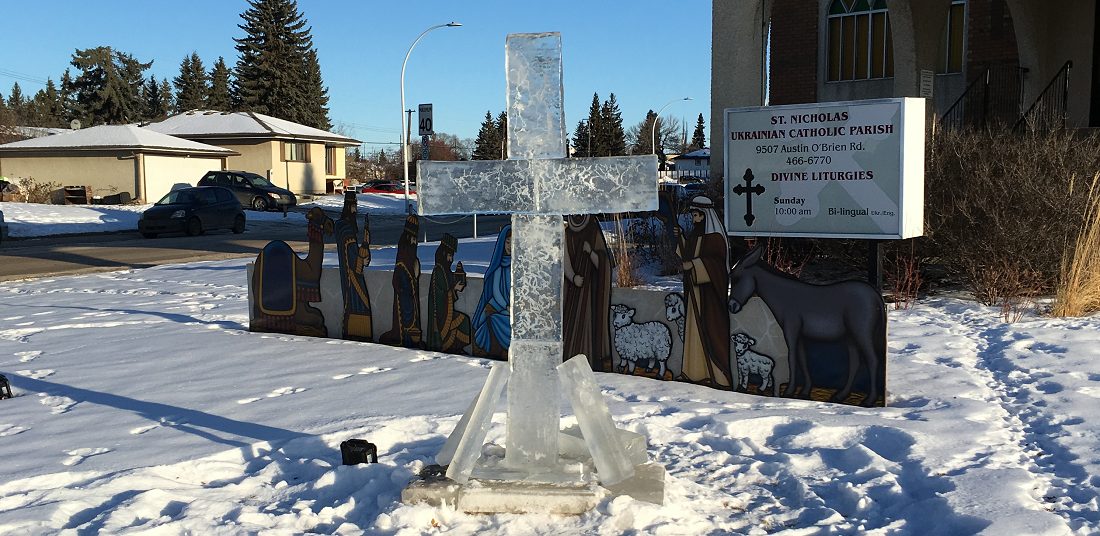This document was adapted from responses gathered in breakout sessions at the 38th UCWLC Eparchial Convention Edmonton Branch Cultural Session, Oct. 2017
In January, we celebrate the great feast of Bohoyavlenia, which means the Manifestation of God or the Theophany. We recall the Baptism of Christ by John in the River Jordan, when God appeared in three persons: Jesus, the Holy Ghost in the form of a dove, and the voice of God the Father.
For Ukrainians, this feast is steeped in tradition:
- On Shchedreyj Vechir – the Eve of Yordan or the Eve of Theophany (January 5th or 18th), it is a day of strict fasting, usually bread and water. The day begins with the Liturgy of St. Basil and Great Blessing of waters. Then, in the early evening, the family gathers for a meatless supper similar to Christmas Eve, but with fewer dishes, the most important being kutia. The meal begins with a prayer followed by a sip of Blessed Water received at morning liturgy if it was attended.
*** Some parishes celebrate this meal together (Sviatchene) on Schedryj Vechir.
- Schedrivky are sung in place of carols. “If we truly want to bestow our Holy Faith to the next generation, on of the most important tools God had given us is our songs. We should make sure that our children, and each one of us, learn to sing the beautiful songs our ancestors have given us, joyfully celebrating the feasts of God’s incarnation, manifestation and love.”
(Quote from Mary Kushnir’s book “Our Celebrations”.
- On January 6th or 19th, The Feast of Jordan is celebrated. It is the final day of the Christmas season and one of the greatest feasts in our church year. Water is blessed usually at a river, or at a cross made of ice. (A wooden form of a cross is filled with water. Once it is frozen, the boards are pulled away and a cross glistens in the sun, as the priest and parishioners pray.)
- The blessed water is taken home. The faithful have always strongly believed the blessed water has the power to heal, purify, sanctify, protect them from danger, help them in troubles, restrain their passions and drive away evil spirits.
- Traditionally, a dough was formed with flour and the holy water and with it, crosses were made for the four walls of the home commemorating the Baptism of Jesus.
- The meal on this day is rich and lavish, with each hostess trying to cook as many delicious foods as she can. Before the meal, each family member takes a sip of Blessed Water, saying, “To our health.”На здоров’я”
- At dusk, the Didukh, which decorated the house for two weeks, is taken outside by the head of the family and solemnly burned.
- The priest visits homes to bless them with Holy Water.
Discuss which of these traditions are practiced in your family/church, that is, traditions which have bridged you to the generation before you.
– Meatless supper on the eve before Theophany.
– Singing of schedrivky.
– Blessing of water in the church, drink some there and take some home.
– Blessing of the home.
How can you build a bridge of these traditions to the next generation in your family? In your church?
– Ensure your children go to church to take part in these traditions.
– Have holy water accessible all year.
– Make dough crosses with the blessed water.
– Have a potluck dinner at the parish.
– If you haven’t made an ice cross before, try it. Then have the water blessed outside beside it.
– Teach schedrivky to all.
– Have a workshop to make the dough crosses and to teach schedrivky.
Discuss ways that you can enhance the traditions, that is, make them more meaningful …in your family ….in your church.
– Involve children in observing water blessing, with a detailed explanation of what is happening.
– Give small handouts of the icon, with explanation and then questions on the back.
– Have children decorate a jar to fill with blessed water. Have children fill their jars first. Teach them about drinking the special water.
– Take blessed water to seniors.
– Have your home blessed. Encourage the priest to speak about home blessing in a homily, being sure to stress that there are no high expectations of hospitality.
– Make Schedriy Vechir a time for the church community. Plan a potluck with all the traditional dishes. Have a joint event with another branch that involves the next generation.
Now choose at least one idea to implement in your own family and/or your church to build bridges of tradition for all generations and into the future.
Adapted by the Religious Education Department of the Edmonton Eparchy from activities created by: UCWLC Edmonton Eparchy 2017: http://eeparchy.com/ Permission granted to reproduce for personal and classroom use.

